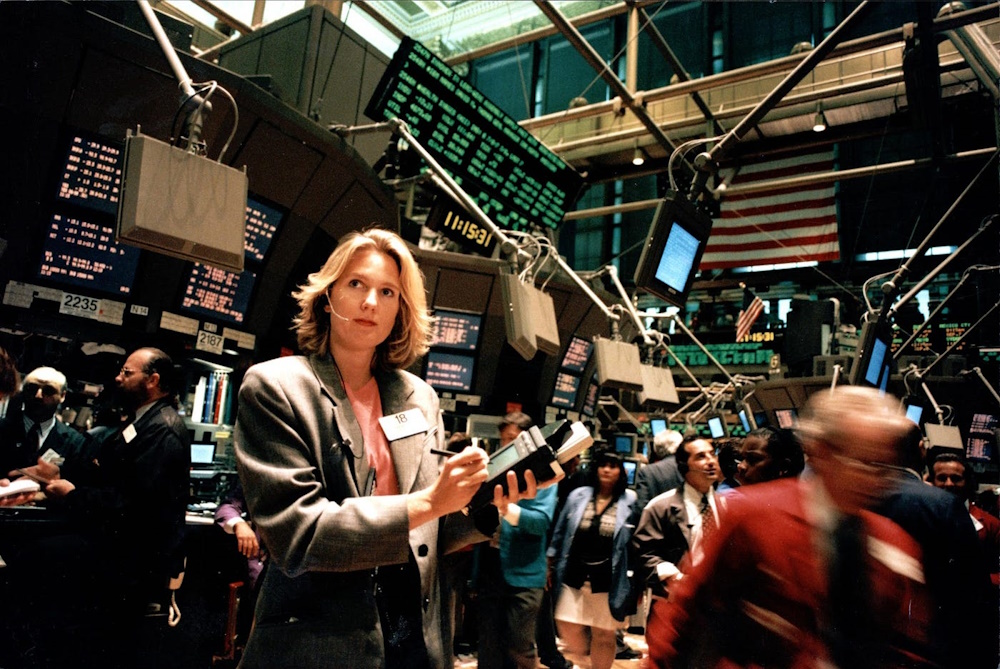
Dow Futures decline as market participants anticipate a fresh set of corporate earnings reports and various central bank interest rate announcements this week. The tariff plans proposed by U.S. President Donald Trump continue to attract significant attention, notably leading car manufacturer Ford to withdraw its annual guidance amid the prevailing uncertainty surrounding the levies. Meanwhile, Palantir’s shares drop in extended hours trading despite the data and analytics group raising its full-year outlook. U.S. stock futures indicated a downward trend on Tuesday, as investors evaluated a new set of corporate earnings for insights into the possible effects of Trump’s trade policies. The Dow Futures contract experienced a decline of 104 points, representing a decrease of 0.3%. Meanwhile, S&P 500 futures fell by 24 points, equating to a 0.4% drop, and Nasdaq 100 futures saw a reduction of 130 points, or 0.7%.
The benchmark S&P 500 experienced a decline on Monday, concluding a series of nine consecutive positive sessions — the most extended such streak in twenty years. Sentiment was affected by Trump’s announcement of new 100% tariffs on foreign-made movies, impacting media firms such as Netflix and Walt Disney in particular, although there are still hopes that the White House’s levies will not be as severe as many had feared.
A reading of activity in the key U.S. services sector, which constitutes over two-thirds of the economy’s output, exceeded expectations, indicating that businesses might be capable of overcoming challenges posed by the tariffs. Nonetheless, a gauge of prices paid by service-oriented firms increased, heightening concerns that the tariffs might exacerbate inflationary pressures. Treasury Secretary Scott Bessent stated at a conference that the tariffs, along with tax cuts and deregulation, would assist in mitigating any short-term market disruptions. Markets are monitoring an impending Federal Reserve interest rate decision this week, alongside announcements from various central banks globally.
In individual stocks, shares in Berkshire Hathaway fell after the long-time CEO and legendary investor announced that he would step down at the end of the year. Ford Motor slashed its full-year guidance as the U.S. carmaker noted uncertainty around the outlook due to Trump’s tariffs. The group’s shares, which reported following the conclusion of U.S. stock markets, experienced a decline in after-hours trading. During a discussion with analysts following the earnings report, CEO Jim Farley indicated that it is still premature to assess the response of Ford’s competitors to the levies, but noted that auto manufacturers possessing the “largest U.S. footprint” will likely benefit from this situation. Earlier this month, GM reduced its profit guidance and Jeep-parent Stellantis pulled its financial forecast. The trio, alongside Ford, constitutes the renowned Big 3 Detroit automakers.
Trump has enacted significant tariffs on imported automobiles and components as part of an effort to revive domestic manufacturing employment, though he has recently granted a limited exemption in response to substantial lobbying from the automotive sector. Ford’s net income for the first quarter fell to $471 million, down from $1.3 billion in the same period last year, while revenue declined to $40.7 billion, surpassing expectations.
Palantir Technologies raised its annual sales forecast; however, shares of the AI-centric data company declined in after-hours trading following quarterly results that fell short of elevated market expectations. The firm, which provides services to governmental clients, has significantly profited from the heightened interest in AI-driven enterprises. The equity has surged over 60% year-to-date, as investors anticipate that advancements in artificial intelligence will catalyze a rise in government expenditures on defense-related technologies. Analysts observed prior to the results that the increase in Palantir’s share price likely signaled elevated expectations for the forthcoming figures. For the first quarter, the adjusted per-share profit was reported at $0.13, aligning with projections. Revenue reached $883.9 million, marginally exceeding the estimates of $862.8 million. Palantir, headquartered in Colorado and co-founded by tech billionaire Peter Thiel, has revised its full-year sales projections to a range of $3.89 billion to $3.90 billion, up from an earlier estimate of $3.74 billion to $3.76 billion.
DoorDash has agreed to buy British peer Deliveroo for 2.9 billion pounds ($3.86 billion) as part of a drive to expand the reach of both of the delivery services and address intensifying competition. According to the agreement, stakeholders of Deliveroo will receive 180 pence in cash for each share of Deliveroo, as stated by the companies on Tuesday. The transaction value indicates a premium of approximately 44% over the closing price of Deliveroo shares on April 4, which was the final business day before DoorDash submitted its acquisition offer letter to Deliveroo. “We will encompass over 40 nations, collectively housing a population exceeding 1 billion individuals, thereby allowing us to equip a greater number of local enterprises with the necessary tools and technology for their success,” stated DoorDash CEO Tony Xu. The acquisition is poised to significantly enhance DoorDash’s operations in Europe, where competitors such as Just Eat Takeaway and Uber Eats have established a robust foothold.
Oil prices experienced an uptick on Tuesday, rebounding from the significant decline observed in the prior session. This movement followed the announcement by a consortium of major producers to expedite output increases, thereby heightening concerns regarding potential oversupply in the market. Brent futures increased by 2.2% to $61.58 a barrel, while U.S. West Texas Intermediate crude futures rose by 2.3% to $58.44 per barrel. Both benchmarks reached their lowest levels since February 2021 on Monday, influenced by the weekend decision by the Organization of the Petroleum Exporting Countries and allies, referred to as OPEC+, to unveil significantly higher production increases than previously anticipated. Saudi Arabia, recognized as the foremost crude exporter globally, is poised to guide the cartel in reversing two years of production reductions, as various OPEC+ members seek to boost sales volumes in response to declining oil prices.
